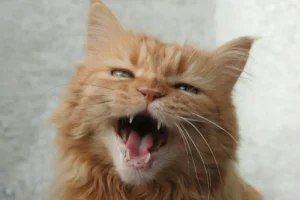Cats seem to have a mysterious ability to transform into energetic balls of fur come nighttime. Whether they are sprinting around the house, knocking things off shelves, or meowing at odd hours, their behavior can leave their owners both amused and confused. So, why do cats act crazy at night?
Many factors contribute to this nocturnal behavior, from their natural hunting instincts to their preference for cooler temperatures after a day of napping. Understanding these reasons can help cat owners create a more peaceful environment for everyone involved. Let’s explore the reasons behind why cats often seem to go a little wild when the sun goes down.
Natural Instincts at Play
Cats’ nighttime craziness can be attributed to their natural instincts honed over centuries of evolution. Cats are crepuscular animals, meaning they are most active during dawn and dusk when their prey is also active. This behavior stems from their wild ancestors who relied on hunting in low light conditions for survival. So, when your kitty starts zooming around the house at 3 a.m., it’s simply following its instinctual urge to hunt and play during these prime hours.
Additionally, cats have exceptional night vision, thanks to their specialized eyes that have a high number of rod cells. This allows them to see in the dark a lot better than we can. This heightened vision makes nighttime the perfect time for them to engage in their predatory behaviors. So, when your cat seems to be going crazy in the wee hours, it’s likely just following its natural instincts to be active and alert during the night.
Lack of Stimulation During the Day
A common reason cats act crazy at night is due to a lack of mental and physical stimulation during the day. Cats are naturally curious and intelligent animals that need mental and physical stimulation to stay happy and healthy. If they don’t get enough of this during the day, they may become restless and look for ways to entertain themselves during the night when things are quieter.
To combat this nighttime craziness, make sure to provide your feline friend with plenty of opportunities for play and exploration during the day. Interactive toys, scratching posts, and cat trees can all help keep your cat engaged and entertained. Consider creating a routine that includes playtime and feeding puzzles to keep your cat mentally stimulated throughout the day, reducing the likelihood of nighttime shenanigans.
Remember, a tired cat is a happy cat, so helping your furry friend burn off energy during the day can lead to a much more peaceful night for both of you.
Circadian Rhythms and Sleep Patterns
Cats are crepuscular creatures, which means they are most active during dawn and dusk. Their natural sleep patterns are different from ours – they can sleep up to 16 hours a day in short and sporadic bursts. This can lead to increased energy levels at night when we are winding down. Their internal clock tells them it’s time to play just as we’re heading to bed, resulting in their nighttime craziness. Providing interactive toys or play sessions during the day can help expend some of that energy, potentially leading to a calmer night for both you and your feline friend.
Influence of Artificial Lighting
Artificial lighting in our homes can disrupt cats’ natural rhythms by confusing their internal clocks. Cats rely on natural light to regulate their sleep-wake cycle, but artificial light can trick their brains into thinking it’s still daytime. This can contribute to their nighttime antics as they may feel more alert and active when they should be resting. To help your cat adjust, try to mimic natural light patterns by dimming lights in the evening and providing a dark, quiet sleeping environment. Consider using nightlights with red or orange hues, as these are less likely to disturb your cat’s sleep. Additionally, maintaining a consistent bedtime routine can also signal to your cat when it’s time to wind down and relax.
Ways to Help Your Cat Relax at Night
Is your cat turning your house into a feline circus at night? Here are some paws-itively helpful tips to help your kitty chill out and get some much-needed shut-eye:
Establish a bedtime routine : Cats thrive on consistency, so creating a calming bedtime routine can signal to your furry friend that it’s time to wind down for the night. Try incorporating activities like gentle play, a bedtime snack, and some quiet cuddle time before lights out.
Provide a cozy sleep environment : Make sure your cat has a comfortable bed in a quiet, dark, and cozy corner of your home. Cats are crepuscular creatures, meaning they are most active during dawn and dusk, so creating a peaceful sleep environment can help them stay settled at night.
Play calming music : Some cats find soft, soothing music or sounds like nature sounds or classical music to be relaxing. Consider playing music specifically designed to help pets relax to create a calming atmosphere in your home.
Use pheromone diffusers : Feliway diffusers release calming pheromones that can help reduce stress and anxiety in cats, promoting a peaceful sleep environment. Place these diffusers in areas where your cat spends most of their time to help them feel more relaxed.
Consult your vet : If your cat’s nighttime antics persist despite your best efforts, it’s always a good idea to consult with your veterinarian. They can rule out any underlying medical issues that may be causing your cat’s behavior and provide tailored advice to help your furry friend relax at night.
Interactive Toys and Playtime Recommendations
Keep your cat entertained and engaged during the day to prevent them from turning nocturnal and wreaking havoc at night. Here are some interactive toys and playtime activities to help channel your cat’s energy in a positive way:
Feather wands : Cats love the thrill of chasing feathers, making feather wands a great way to encourage your cat to pounce, jump, and play.
Interactive puzzle feeders : Stimulate your cat’s mind by feeding them through interactive puzzle feeders. This not only satisfies their hunting instincts but also keeps them engaged for longer periods during mealtime.
Catnip toys : Catnip can have a calming effect on some cats and make playtime even more enjoyable. Invest in catnip toys to keep your feline friend entertained and happy.
Interactive laser toys : A laser pointer can provide endless entertainment for your cat as they chase the elusive red dot around the room. Just make sure to end the play session with a tangible toy or treat to prevent frustration.
Rotating toys : Keep your cat’s interest piqued by rotating their toys regularly. This prevents boredom and ensures that they stay engaged with their playthings.
Engaging your cat in these interactive toys and playtime activities during the day can help tire them out, leading to a more restful night’s sleep for both you and your furry companion.
Importance of Consistent Routine
Have you ever wondered why your precious feline friend seems to turn into a nighttime ninja, bouncing off the walls and causing chaos when you’re trying to catch some z’s? Well, one key factor that could be contributing to this behavior is the lack of a consistent routine. Cats are creatures of habit, and when their daily schedule is all over the place, it can throw their internal clock out of whack.
By establishing a regular routine for feeding, playtime, and bedtime, you can help your cat better regulate their energy levels and behavior. Creating a calm and predictable environment for your furry friend can go a long way in preventing those late-night zoomies that leave you sleep-deprived and at your wit’s end.
So, remember, consistency is key when it comes to keeping your cat’s nighttime antics in check. Stick to a schedule that works for both you and your feline companion, and you’ll both rest easy knowing what to expect each night.
Additional Insight: Gradually adjust your cat’s routine by making small changes each day rather than drastically altering their schedule all at once. This gentle approach can help your cat adapt more easily and reduce the likelihood of nighttime craziness.
Alex, a passionate animal lover, has experience in training and understanding animal behavior. As a proud pet parent to two dogs and three cats, he founded AnimalReport.net to share insights from animal experts and expand his knowledge of the animal kingdom.




